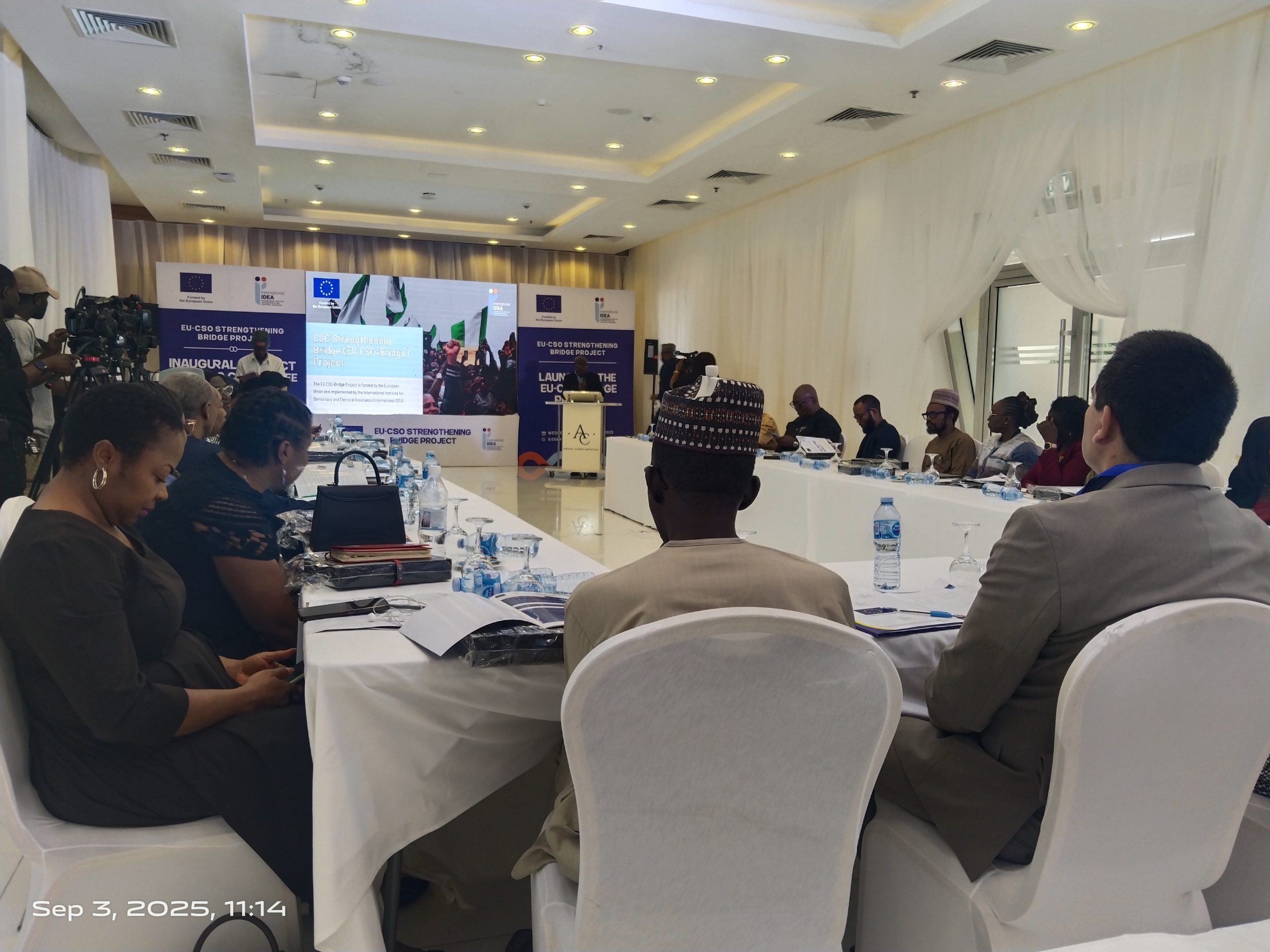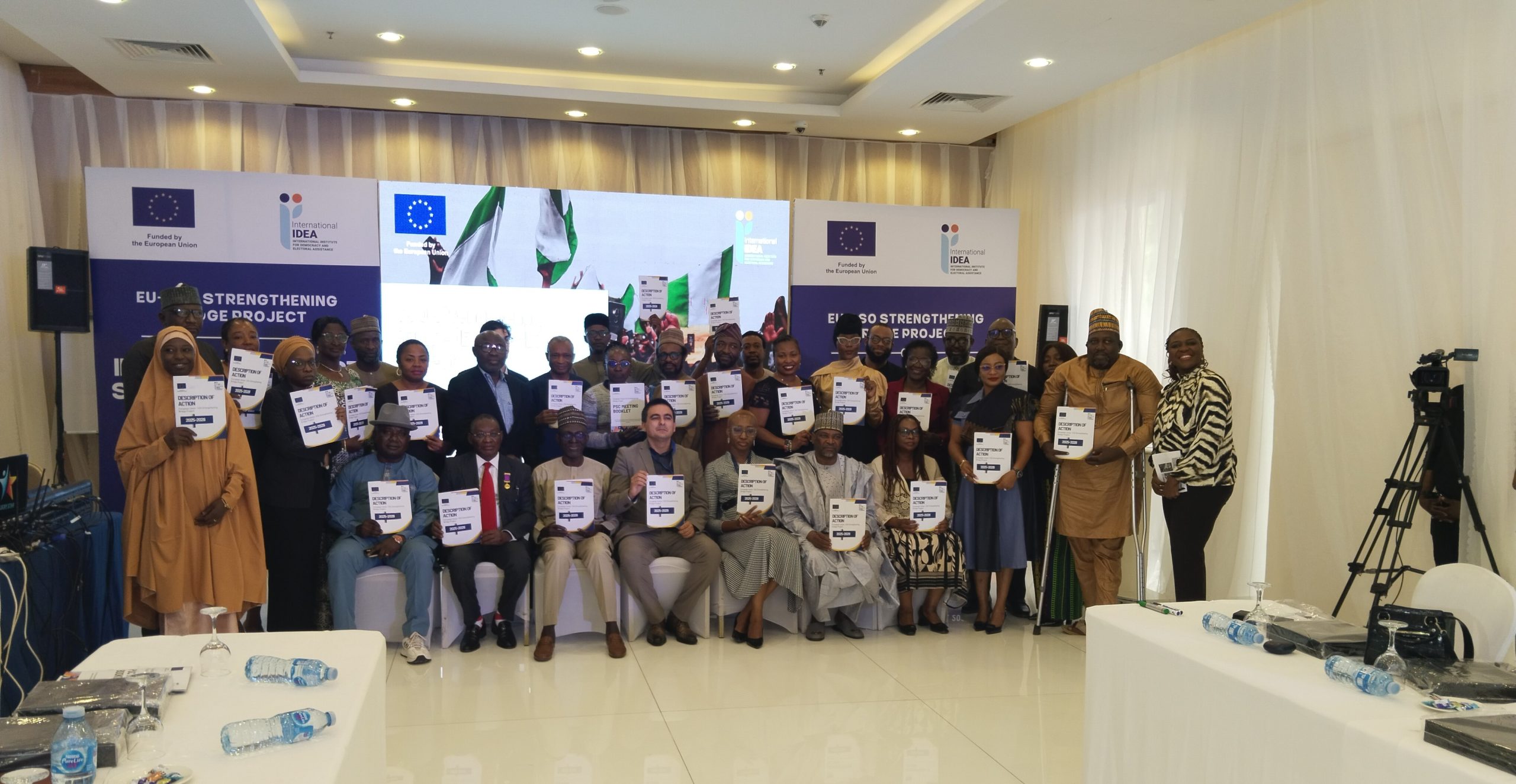Maureen Okpe
The European Union, (EU) and the International Institute for Democracy and Electoral Assistance (International IDEA) has launched the CSO Strengthening Bridge (EU CSO-Bridge) Project, an initiative designed to enhance the credibility of civil society organisations (CSOs), improve regulatory and operational environment in Nigeria.
Funded by the EU and implemented by International IDEA, the project will run for 36 months and builds on the gains of the recently concluded EU-funded Agents for Citizen-driven Transformation (ACT) Programme.
The project launched on Monday, in Abuja aim to create a more enabling environment for CSOs to thrive and contribute to Nigeria’s sustainable development agenda, particularly in governance, accountability, and inclusive development.
Read Also: IWD: EU-IIDEA urges FG, stakeholders on stronger commitment to women’s rights protection
At the launch, Mr. Reuben Alba Aguilera, Head of the Governance, Peace, and Migration Section at the European Union Delegation to Nigeria and ECOWAS, reaffirmed the EU’s longstanding commitment to supporting Nigeria’s civil society.
He described the EU CSO-Bridge Project as a continuation of the EU’s efforts to build a sustainable civic space where CSOs can effectively contribute to democracy and national development.

According to him, “civil society is essential for any society that hopes to thrive, and their empowerment ensures that governance is inclusive and accountable.”
On his part, Mr. Danladi Plang, Head of Programme at International IDEA, said the project is about connecting key stakeholders, regulators, CSOs, sub-national actors, and citizens in a collaborative framework aimed at reform and mutual accountability.
He stressed that beyond improving the external regulatory landscape, there is also a strong emphasis on building the internal capacities of CSOs, including their coordination, transparency, and self-regulation.
He highlighted existing regulatory challenges such as duplication of registration processes at federal and state levels, and inconsistencies in compliance expectations across government agencies, noting that harmonisation is a key goal of the project.
During the launch, the inaugural Project Steering Committee (PSC) meeting was also convened, bringing together representatives from government institutions, civil society, the private sector, and development partners. The PSC is expected to provide strategic oversight and advocacy for necessary reforms that will strengthen the CSO operational environment across Nigeria.
Speaking at the event, Senator Anthony Yaro, Vice Chairman of the Senate Committee on Diaspora and NGOs, emphasized the importance of improving the integrity and public perception of CSOs.
He noted that many CSOs face societal distrust and operational difficulties, which the new initiative seeks to address by providing structural and legislative support.
He further disclosed that the 10th National Assembly has taken proactive steps by establishing a dedicated interface office to maintain constant communication with CSOs and promptly respond to policy or legal issues affecting them.
Yaro also reiterated the significance of coordination mechanisms to amplify the collective voice of CSOs and ensure they can engage constructively with government and other stakeholders. He acknowledged the increasingly complex global regulatory landscape and emphasized the need for clarity and mutual understanding between regulators and civil society.
He commended the EU on the project to invest nearly four million euros(€4000,000,) equivalent to over 6 billion naira at current exchange rates—in what he described as a “massive investment” in Nigeria’s democratic infrastructure.
Read Also: EU-IDEA, NBA train over 300 lawyers on professional conduct
While thanking the EU for its continued support, despite global trends of shrinking development funding, Aguilera underscored the importance of CSOs not only as development actors but as custodians of democratic integrity and agents of social progress.
He called on all stakeholders to ensure the successful implementation of the EU CSO-Bridge Project, which he described as “the beginning of a journey” toward a more inclusive, transparent, and accountable Nigeria.
The EU CSO-Bridge Project is expected to deliver three main outcomes: the establishment of functioning coordination mechanisms at national and state levels, improved CSO capacity for compliance and self-regulation, and a harmonised regulatory framework that facilitates CSO registration and operations.

